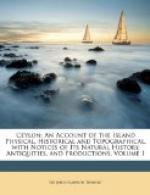[Footnote 1: “La science geographique, comme les autres sciences en general, notammement l’astronomie, commenca a se former chez les Arabes, dans la derniere moitie du viii^{e} siecle, et se fixa dans la premiere moitie du ix^{e}. On fit usage des itineraires traces par les chefs des armees conquerantes et des tableaux dresses par les gouveneurs de provinces; en meme temps on mit a la contribution les methodes propagees par les Indians, les Persans, et surtout les Grees; qui avaient apporte le plus de precision dans leurs operations.”—REINAUD, Introd. Aboulfeda, &c., p. xl.]
[Footnote 2: REINAUD, Introd. Aboulfeda, p. cxxii.]
[Footnote 3: Ibid., vol. i. p. xl.]
Hence the records of their voyages, though presenting numerous exaggerations and assertions altogether incredible, exhibit a superiority over the productions of the Greeks and Romans. To avoid the fault of dulness, both the latter were accustomed to enliven their topographical itineraries, not so much by “moving accidents,” and “hair-breadth ’scapes,” as by mingling fanciful descriptions of monsters and natural phenomena, with romantic accounts of the gems and splendours of the East. Hence from CTESIAS to Sir JOHN MANDEVILLE, every early traveller in India had his “hint to speak,” and each strove to embellish his story by incorporating with the facts he had witnessed, improbable reports collected from the representations of others. Such were their excesses in this direction, that the Greeks formed a class of “paradoxical” literature, by collecting into separate volumes the marvels and wonders gravely related by their voyagers and historians.[1]
[Footnote 1: Such are the Mirabiles Auscultationes of ARISTOTLE, the Incredibilia of PALEPHATES, the Historiarum Mirabilium Collectio of ANTIGONUS CARYSTIUS, the Historiae Mirabiles of APOLLONIUS THE MEAGRE, and the Collections of PHILEGON of Tralles, MICHAEL BELLUS, and many other Greeks of the Lower Empire. For a succinct account of these compilers, see WESTERMAN’S Hapre [Greek: doxographoi], Scriptores Rerum Mirabilium Graeci Brunswick, 1830.]
The Arabs, on the contrary, with sounder discretion, generally kept their “travellers’ histories” distinct from their sober narratives, and whilst the marvellous incidents related by adventurous seamen were received as materials for the story-tellers and romancers, the staple of their geographical works consisted of truthful descriptions of the countries visited, their forms of government, their institutions, their productions, and their trade.




